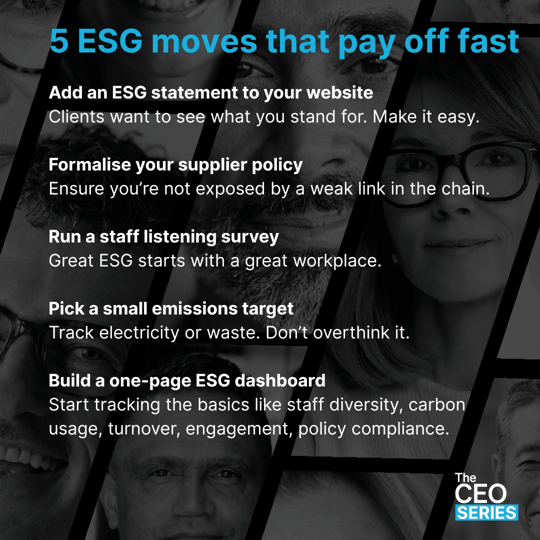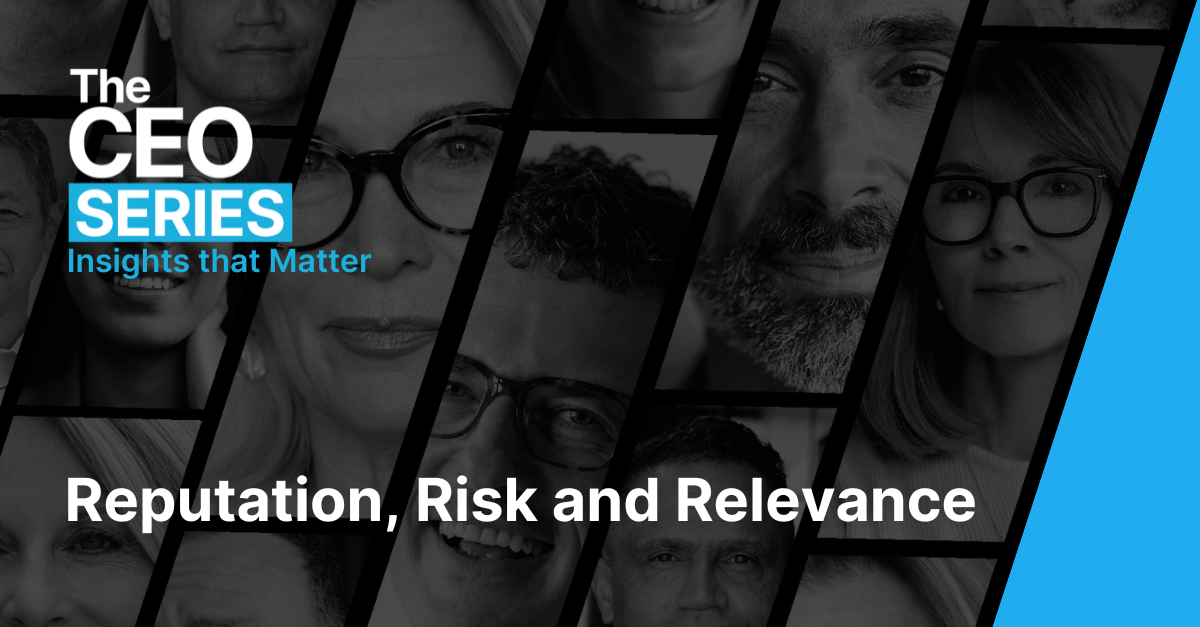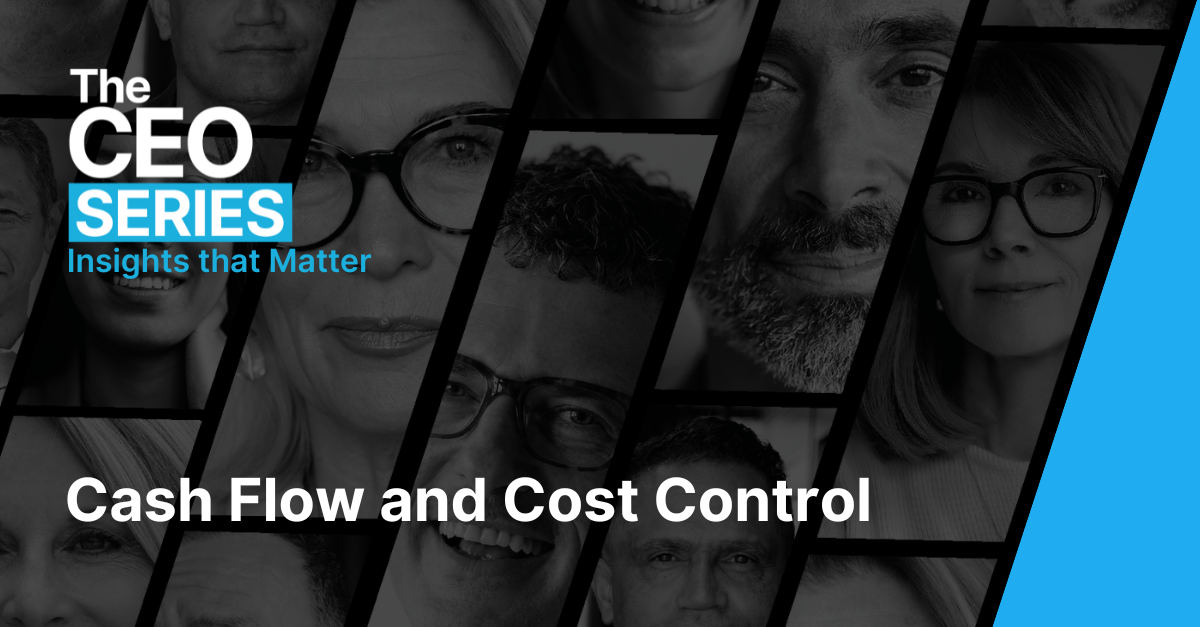Why ESG is the most strategic thing you’re ignoring
You didn’t become a CEO to write policies.
And yet, here you are – asked for your modern slavery statement mid-contract. Pressed on diversity stats by a prospective hire. Losing a tender you were sure you’d win, only to find out the client “weighted ESG criteria more heavily this year.”
Welcome. To your credibility check.
ESG has quietly moved from the domain of listed corporates into the everyday reality of businesses of all sizes. Not because regulators demanded it – but because markets, talent and clients did.
And while many leaders still assume ESG is optional, others are waking up to a new truth: your values are part of your value proposition.
The ones who get it aren’t crafting 80-page reports. They’re building leaner, smarter ESG habits that strengthen operations, sharpen positioning and open doors.
They’re doing the right things, visibly.
“It’s important that we actually take action. Sometimes there is more focus on words that are written when it would be better, less resources were spent on that and more on getting out and doing things.”
- Barry Irvin, Executive Chairman, Bega Cheese (The Australian)
The ESG disconnect
ESG is a proxy for how well-run your business is, yet many leaders still treat it like fluff.
Environmental. Social. Governance.
Three words. A thousand assumptions.
Rather than hugging trees or hosting diversity workshops immediately coming to mind – you should think about the risk, resilience and reputation of your business.
- Can you withstand regulatory change?
- Can you attract and retain top talent?
- Are your operations ethical and future-proof?
- Can your stakeholders trust what you say?
Because when things go wrong – really wrong – it’s usually one of those four pillars that gave way.
90% of Australian institutional investors now assess ESG risk in decision-making (PwC, 2023), while 70% of SMEs globally say ESG is impacting their ability to win new business (HSBC, 2022).
What the smart operators are doing
ESG is being embedded through practical, deliberate actions – with consistent, smaller-scale habits making a difference.
They lead with values – and operationalise them. Not just on the wall. In the hiring process. In procurement. In complaints handling. This is increasingly shaping reputation, with SEEK reporting that one in three jobseekers now assess a company’s social and environmental stance before applying.
They map the risks before they escalate. A basic ESG risk review often uncovers overlooked vulnerabilities – whether in supplier behaviour, compliance or governance. The World Economic Forum notes that more than half of businesses without defined ESG risk management have already experienced legal or reputational fallout.
They make progress one commitment at a time. Many leaders are choosing one ESG priority per quarter and building momentum gradually. HSBC found that SMEs with structured ESG plans saw 18% stronger customer retention compared to those without.
They make it someone’s job. ESG needs ownership – even if it’s 5% of someone’s role. BCG reports that organisations with named ESG ownership are twice as likely to hit their sustainability targets.
They build their ESG story. It’s not enough to do the work. You have to communicate it.
Stakeholders want visibility, not spin. Edelman’s latest Trust Barometer found that 63% of consumers are more likely to buy from companies that are transparent about ESG efforts.
Outdated thinking that could be holding you back
You’re not alone if some of these sound familiar. But what used to be true about ESG doesn’t hold anymore – and clinging to these ideas could be costing you.
Some business leaders still believe they’re too small to need ESG. In reality, being small often makes it easier to act quickly and authentically, and you’re more visible than ever.
There’s also a belief that ESG is expensive. But the real cost usually shows up in missed deals, poor retention, or higher insurance premiums. Inaction costs more than implementation.
Others assume they’re already doing fine because people “like working here.” But ESG isn’t about being liked – it’s about being accountable. Clients, candidates and investors want proof.
And then there’s the idea that ESG can wait until you raise capital or go through due diligence. The truth? You’ll be asked for it long before then, and how you answer will matter.
What’s coming (ready or not)
ESG influences your access to growth, capital and talent. Whether you run a 20-person consultancy or a national enterprise, you’re being evaluated on how you lead, how you treat people and how you manage risk.
Here’s what’s already in play, and accelerating:
ESG is now baked into how decisions are made
Whether it’s a bank loan, a government grant, a partnership deal, or a major client engagement – ESG factors are increasingly part of the assessment. Not just in principle, but in formal scoring systems and approval frameworks.
Regulation is catching up and extending downstream
Australia’s mandatory climate disclosure regime officially kicked off in January 2025. Even if you’re not listed, you’ll be expected to support your clients, lenders or partners in meeting their obligations.
Investors and lenders are linking ESG to risk and pricing accordingly
Credit terms, insurance premiums and capital access are increasingly influenced by ESG risk. 82% of global institutional investors plan to divest from companies with poor ESG performance (PwC, 2023). If you can’t demonstrate good governance or risk management, expect to pay for it.
Talent is screening you before you even speak
People want to work for companies they trust. Not perfectly “green” – but accountable, purpose-driven and socially aware. ESG performance has become a core employer brand filter.
Stakeholders want transparency, not perfection
Clients, partners and communities aren’t expecting utopia. But they are demanding action and honesty. The Edelman Trust Barometer (2023) found 69% of people say a company’s ESG track record directly impacts their willingness to engage, buy or refer.
Bottom line?
If ESG isn’t in your business strategy, it’s already in someone else’s decision-making framework – driving their credibility, relevance and competitive advantage.
How to start – today
Be practical and start small. Don’t defer action in favour of another strategy day. All you need to get going is a checklist and an hour (or two) of honesty.
The 10-point ESG Starter Checklist
- Do we have a clear code of conduct?
- Do we know our top 5 ESG risks?
- Do we have any environmental targets or data?
- Do we conduct employee engagement surveys?
- Do we have a DEI statement or policy?
- Is there a whistleblower or grievance mechanism?
- Are our suppliers aligned to our values?
- Do we measure governance beyond financial compliance?
- Do we have ESG embedded in our onboarding/training?
- Do we tell our ESG story anywhere externally?
Start here. Plug the gaps. Build as you go.
Creating momentum will help you shape a strategy that is meaningful, credible and nuanced to your way of working.
ESG has become a marker of credibility that influences how businesses are perceived, trusted and chosen. The companies paying attention are building alignment, integrity and resilience into the way they work.
And with more eyes on how businesses operate, how a business shows up is becoming just as important as what it delivers.




